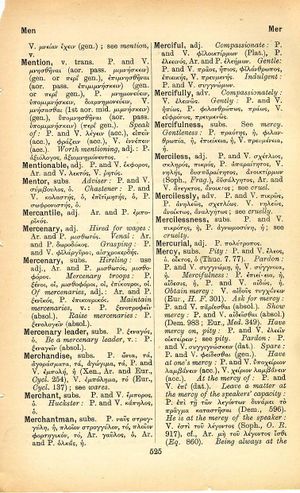mercy: Difference between revisions
(Woodhouse 3) |
(CSV4) |
||
| Line 1: | Line 1: | ||
{{ | {{Woodhouse1 | ||
| | |Text=[[File:woodhouse_525.jpg|thumb|link={{filepath:woodhouse_525.jpg}}]]'''subs.''' | ||
<b class="b2">Pity</b>: P. and V. [[ἔλεος]], ὁ. [[οἶκτος]], ὁ (Thuc. 7, 77). | |||
<b class="b2">Pardon</b>: P. and V. [[συγγνώμη]], ἡ, V. [[σύγγνοια]], ἡ. | |||
<b class="b2">Mercifulness</b>: P. [[ἐπιείκεια]], ἡ, [[αἴδεσις]], ἡ, P. and V. [[αἰδώς]], ἡ. | |||
<b class="b2">Obtain mercy</b>: V. αἰδοῦς τυγχάνειν (Eur., ''H.F.'' 301). | |||
<b class="b2">Ask for mercy</b>: P. and V. παρίεσθαι (absol.). | |||
<b class="b2">Show mercy</b>: P. and V. αἰδεῖσθαι (absol.) (Dem. 983; Eur., ''Med.'' 349). | |||
<b class="b2">Have mercy on, pity</b>: P. and V. ἐλεεῖν οἰκτείρειν; see [[pity]]. | |||
<b class="b2">Pardon</b>: P. and V. συγγιγνώσκειν (dat.). | |||
<b class="b2">Spare</b>: P. and V. φείδεσθαι (gen.). | |||
<b class="b2">Have at one's mercy</b>: P. and V. ὑποχείριον [[λαμβάνω|λαμβάνειν]] (acc.), V. χείριον [[λαμβάνω|λαμβάνειν]] (acc.). | |||
<b class="b2">At the mercy of</b>: P. and V. ἐπί (dat.). | |||
<b class="b2">Leave a matter at the mercy of the speakers' capacity</b>: P. ἐπὶ τῇ τῶν λεγόντων δυνάμει τὸ [[πρᾶγμα]] καταστῆσαι (Dem., 596). | |||
<b class="b2">He is at the mercy of the speaker</b>: V. ἐστὶ τοῦ λέγοντος (Soph., ''O.R.'' 917), cf., Ar. μὴ τοῦ λέγοντος [[ἴσθι]]. (<b class="b2">Eq.</b> 860). | |||
<b class="b2">Being always at the mercy of their assailants</b>: P. ὄντες ἀεὶ τῶν ἐπιτιθεμένων (Plat., ''Pol.'' 307E). | |||
(<b class="b2">I think</b>) <b class="b2">that the virtues of many should not be at the mercy of one man</b>: P. μὴ ἐν ἑνὶ ἀνδρὶ πολλῶν ἀρετὰς κινδυνεύεσθαι (Thuc. 2, 35). | |||
}} | }} | ||
Revision as of 09:46, 21 July 2017
English > Greek (Woodhouse)
subs.
Pity: P. and V. ἔλεος, ὁ. οἶκτος, ὁ (Thuc. 7, 77). Pardon: P. and V. συγγνώμη, ἡ, V. σύγγνοια, ἡ. Mercifulness: P. ἐπιείκεια, ἡ, αἴδεσις, ἡ, P. and V. αἰδώς, ἡ. Obtain mercy: V. αἰδοῦς τυγχάνειν (Eur., H.F. 301). Ask for mercy: P. and V. παρίεσθαι (absol.). Show mercy: P. and V. αἰδεῖσθαι (absol.) (Dem. 983; Eur., Med. 349). Have mercy on, pity: P. and V. ἐλεεῖν οἰκτείρειν; see pity. Pardon: P. and V. συγγιγνώσκειν (dat.). Spare: P. and V. φείδεσθαι (gen.). Have at one's mercy: P. and V. ὑποχείριον λαμβάνειν (acc.), V. χείριον λαμβάνειν (acc.). At the mercy of: P. and V. ἐπί (dat.). Leave a matter at the mercy of the speakers' capacity: P. ἐπὶ τῇ τῶν λεγόντων δυνάμει τὸ πρᾶγμα καταστῆσαι (Dem., 596). He is at the mercy of the speaker: V. ἐστὶ τοῦ λέγοντος (Soph., O.R. 917), cf., Ar. μὴ τοῦ λέγοντος ἴσθι. (Eq. 860). Being always at the mercy of their assailants: P. ὄντες ἀεὶ τῶν ἐπιτιθεμένων (Plat., Pol. 307E). (I think) that the virtues of many should not be at the mercy of one man: P. μὴ ἐν ἑνὶ ἀνδρὶ πολλῶν ἀρετὰς κινδυνεύεσθαι (Thuc. 2, 35).

